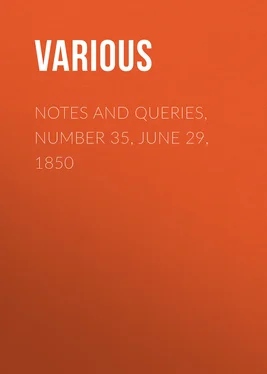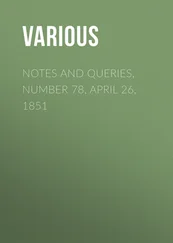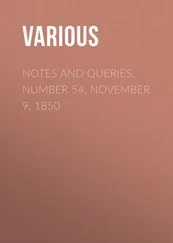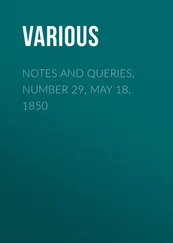Various - Notes and Queries, Number 35, June 29, 1850
Здесь есть возможность читать онлайн «Various - Notes and Queries, Number 35, June 29, 1850» — ознакомительный отрывок электронной книги совершенно бесплатно, а после прочтения отрывка купить полную версию. В некоторых случаях можно слушать аудио, скачать через торрент в формате fb2 и присутствует краткое содержание. Жанр: foreign_antique, periodic, foreign_edu, на английском языке. Описание произведения, (предисловие) а так же отзывы посетителей доступны на портале библиотеки ЛибКат.
- Название:Notes and Queries, Number 35, June 29, 1850
- Автор:
- Жанр:
- Год:неизвестен
- ISBN:нет данных
- Рейтинг книги:5 / 5. Голосов: 1
-
Избранное:Добавить в избранное
- Отзывы:
-
Ваша оценка:
- 100
- 1
- 2
- 3
- 4
- 5
Notes and Queries, Number 35, June 29, 1850: краткое содержание, описание и аннотация
Предлагаем к чтению аннотацию, описание, краткое содержание или предисловие (зависит от того, что написал сам автор книги «Notes and Queries, Number 35, June 29, 1850»). Если вы не нашли необходимую информацию о книге — напишите в комментариях, мы постараемся отыскать её.
Notes and Queries, Number 35, June 29, 1850 — читать онлайн ознакомительный отрывок
Ниже представлен текст книги, разбитый по страницам. Система сохранения места последней прочитанной страницы, позволяет с удобством читать онлайн бесплатно книгу «Notes and Queries, Number 35, June 29, 1850», без необходимости каждый раз заново искать на чём Вы остановились. Поставьте закладку, и сможете в любой момент перейти на страницу, на которой закончили чтение.
Интервал:
Закладка:
Various
Notes and Queries, Number 35, June 29, 1850 / A Medium of Inter-communication for Literary Men, Artists, Antiquaries, Genealogists, etc
Notes
GEORGE GORING, EARL OF NORWICH, AND HIS SON GEORGE, LORD GORING
G.'s inquiry (Vol. i., p. 22.) about the two Gorings of the Civil War—a period of our history in which I am much interested—has led me to look into some of the sources of original information for that time, in the hope that I might be enabled to answer his Queries. I regret I cannot yet answer his precise questions, when Lord Goring the son was married, and when and where he died? but I think the following references to notices of the father and the son will be acceptable to him; and I venture to think that the working out in this way of neglected biographies, is one of the many uses to which your excellent periodical may be applied.
Confusion has undoubtedly been made between the father and son by careless compilers. But whoever carefully reads the passages of contemporary writers relating to the two Gorings, and keeps in mind that the title of Earl of Norwich, given by Charles I. in November, 1644, to the father, was not recognised by the parliamentary party, will have no difficulty in distinguishing between the two. Thus it will be seen in two of the passages which I subjoin from Carte's Letters , that in 1649 a parliamentarian calls the father Lord Goring, and Sir Edward Nicholas calls him Earl of Norwich.
Burke, in his Dormant and Extinct Peerages , vol. iii., makes the mistake of giving to the father the son's proceedings at Portsmouth at the beginning of the Civil War.
Lord Goring the son, then Colonel Goring, commanding a regiment in the Low Countries, was, at the siege of Breda, September, 1637, severely wounded in the leg, and had a narrow escape of losing it. Sir William Boswell, the English ambassador at the Hague, writes to Bramhall, then Bishop of Derry, and afterwards Archbishop of Armagh:—
"Colonel Goring having the guard of the English in the approaches, was shot so dangerously cross the shin of his leg, a little above his ankle, as the chirurgion at first resolved to cut off his leg to save his life; but upon second thoughts, and some opposition by one of them against four, they forebare; and now, thanks be to God, he is gotten out of danger of losing life or leg this bout: his excellent merits caused a great sorrow at his misfortune, and now as great comfort in the hope of his recovery"—( Rawdon Papers , p. 39.)
That the son was already married to Lady Letitia Boyle at Christmas, 1641, appears from a letter of the Earl of Cork, the lady's father, to the Earl of Norwich (at that time Lord Goring), in Lord Orrery's State Letters (vol. i. p. 5. Dublin edition):—
"I have scarce time to present my service to you and your lady, and to George and my poor Letitia, whom God bless."
In Carte's Collection of Letters (vol. i. p. 359.) is a letter from Lord Byron, dated "Beauvois, March 1-11, 1650," to the Marquis of Ormond, stating that Lord Goring the son has come to Beauvois, and is on his way to Spain, about the settlement of a pension which had been promised him there, and also to endeavour to get arms and money for the King's service in Ireland; and that, having settled his business in Spain, he desires nothing better than to serve as a volunteer under Ormond for King Charles. Lord Byron strongly recommends Ormond to avail himself of Goring's services:—
"I am confident my Lord Goring may be serviceable to your Excellence in many respects, and therefore have rather encouraged him in this his resolution, than any ways dehorted him from it; and especially because he is to pass by the Spanish Court, where he hath such habitudes, by reason of the service both his father and he hath done that crown."
In an intercepted letter of a parliamentarian, dated Jan. 8, 1649, which is in Carte's Letters (vol. i. p. 201.), is the following mention of the Earl of Norwich, then under sentence of death by the High Court of Justice:—
"Our great minds say, Thursday the King shall die, and two or three great Lords with him, Capel and Loughborough being two of them. Goring hath gotten Ireton to friend, who excuses him yet."
Sir E. Nicholas writes, April 8, 1649, to the Marquis of Ormond, that the Earl of Norwich (as he styles him) has been reprieved at the suit of the Spanish and Dutch ambassadors. (Carte's Letters , vol. i. p. 247.)
In the following passage of a speech, in the discussions about the House of Lords in Richard Cromwell's Parliament, there is no doubt that the Earl of Norwich is referred to as Lord Goring: and I should infer that George Lord Goring the son was then dead, as he had unquestionably done more than enough to forfeit his privileges in the view of Commonwealth men:—
"What hath the son of Lord Goring or Lord Capel done to forfeit their right?"—(Burton's Diary , iii. 421. Feb. 22. 1659.)
George Lord Goring the son is referred to in another speech preserved in Burton's Diary , and is there called "young Lord Goring." (iii. 206.)
Pepys mentions the return of "Lord Goring" from France, April 11, 1660 (vol. i. p. 54.). Lord Braybrooke's note says that this was "Charles, who succeeded his father as second Earl of Norwich." Is it certain that this was not the old Earl of Norwich himself?
The death of the old Earl of Norwich is thus chronicled in Peck's Desiderata Curiosa , p. 542.:—
"Jan. 6. 1662-3, died Lord Goring on his passage by land from Hampton Court to London, at Brainford, about eighty years of age: he was Earl of Norwich."
CH.MSS. OF BISHOP RIDLEY: A "NOTE" AND A "QUERY."
A "Note" in the Original Letters relative to the English Reformation, published by the Parker Society, p. 91., mentions the existence of an important MS. treatise by Bishop Ridley, which had been unknown when the works of that prelate were collected and published by the Parker Society in 1841. It seems to be desirable that the fact should be placed on record in your most useful publication: the "Note" is as follows:—
"A copy of Bishop Ridley's 'Conference by writing with M. Hoper, exhibited up to the council in the time of King Edward the Sixth,' was in the possession of Archbishop Whitgift: see his Defence of the Answer to the Admonition , A.D. 1574, p. 25. But its existence was unknown (see Ridley's Life of Bishop Ridley , Lond. 1763, p. 315.) in later years, till a copy, slightly imperfect, was discovered in 1844, in the extensive collection of MSS. belonging to Sir Thomas Phillips, Bart."
There is another MS. treatise by Bishop Ridley, that has been missing for nearly three centuries, respecting which I should be glad to offer a "Query:" I allude to Ridley's Treatise on Election and Predestination . The evidence that such a piece ever existed is, that Ridley, in answer both to a communication from prison, signed by Bishop Ferrar, Rowland Taylor, John Bradford, and Archdeacon Philpot, and probably to other letters from Bradford, wrote,—
"Where you say that, if your request had been heard, things, you think, had been in better case than they be, know you that, concerning the matter you mean, I have in Latin drawn out the places of the Scriptures, and upon the same have noted what I can for the time. Sir, in those matters I am so fearful, that I dare not speak further, yea, almost none otherwise, than the very text doth, as it were, lead me by the hand."— Works of Bishop Ridley , Parker Soc., p. 368.
And to this statement Bishop Coverdale, in the Letters of the Martyrs , Day, 1564, p. 65., caused the following side-note to be printed:—
Читать дальшеИнтервал:
Закладка:
Похожие книги на «Notes and Queries, Number 35, June 29, 1850»
Представляем Вашему вниманию похожие книги на «Notes and Queries, Number 35, June 29, 1850» списком для выбора. Мы отобрали схожую по названию и смыслу литературу в надежде предоставить читателям больше вариантов отыскать новые, интересные, ещё непрочитанные произведения.
Обсуждение, отзывы о книге «Notes and Queries, Number 35, June 29, 1850» и просто собственные мнения читателей. Оставьте ваши комментарии, напишите, что Вы думаете о произведении, его смысле или главных героях. Укажите что конкретно понравилось, а что нет, и почему Вы так считаете.












